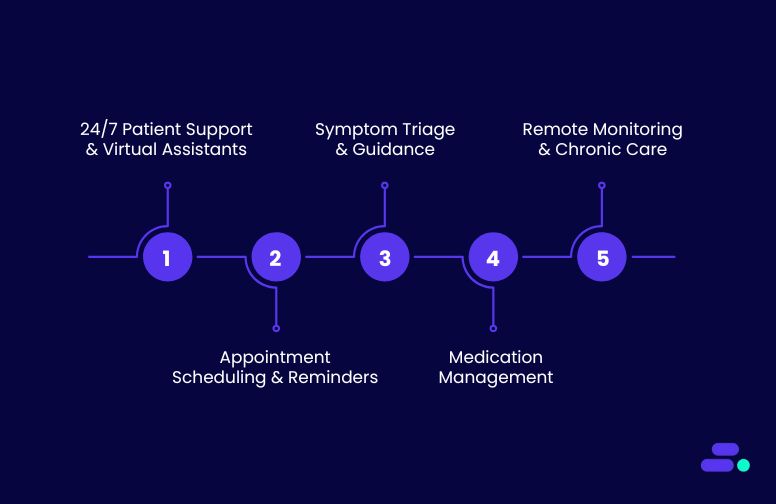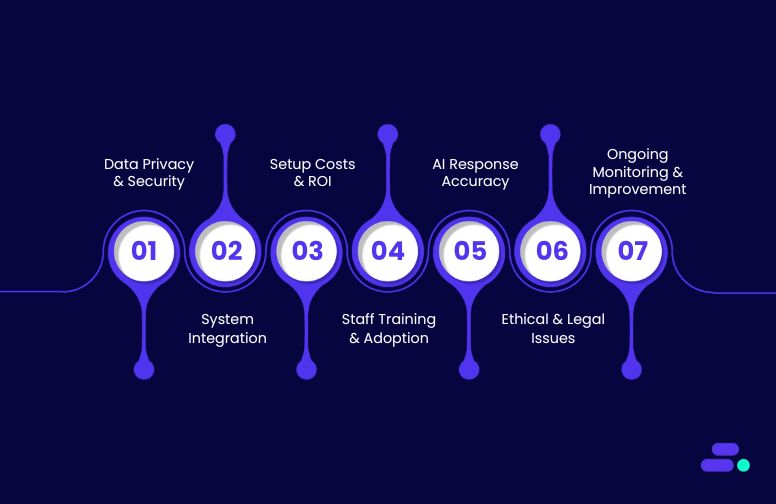This is a div block with a Webflow interaction that will be triggered when the heading is in the view.

Modernize your cloud. Maximize business impact.
A busy physician on morning rounds, speaking into their phone for just 30-45 seconds about a patient's condition. By the time they move to the next room, a complete progress note is ready for their EMR, detailed and written in their own style. No hours spent on documentation after shift. No administrative burden cutting into patient care time.
This is now a reality.
In August 2025, Pieces Technologies launched "Pieces in your Pocket," an AI-powered assistant that's reducing documentation time for inpatient physicians by 50%. The tool doesn't simply transcribe words, but understands context, learns from prior notes, and adapts to each physician's documentation style to generate clinical-quality records from brief voice interactions.
This innovation represents a broader shift happening across healthcare, driven by Conversational AI. Virtual assistants and voice agents are increasingly taking on essential roles, from clinical documentation and decision support to patient follow-ups and care coordination, fundamentally changing how healthcare is delivered.
This guide explores how Conversational AI is transforming healthcare, the technologies powering this change, and the real-world benefits for patients, providers, and healthcare organizations.
Quick Glance
- Conversational AI in healthcare refers to AI systems that enable human-like interactions between patients and healthcare providers, improving engagement and operational efficiency.
- Key use cases include 24/7 patient support, symptom triage, appointment scheduling, medication management, and remote patient monitoring.
- Challenges in implementing Conversational AI include ensuring data privacy and security, integration with existing systems, and maintaining high response accuracy.
- Cloudtech offers tailored Conversational AI solutions for healthcare, helping providers implement AI-driven tools that streamline operations and improve patient care.
- The future of Conversational AI in healthcare includes proactive health monitoring, personalized medicine, enhanced virtual assistants, and seamless integration with EHRs.
What is Conversational AI in healthcare?
Conversational AI in healthcare refers to the use of AI technologies to facilitate human-like interactions between patients and healthcare systems.
It can understand and respond to both text and voice inputs using tools like Natural Language Processing (NLP), speech recognition, and machine learning. This makes it a crucial technology for automating a wide range of healthcare processes, reducing human workload, and providing patients with personalized, 24/7 assistance.
In essence, Conversational AI helps healthcare providers offer interactive, efficient, and scalable services without human intervention. It enhances the overall patient experience by providing quick, accurate answers to common queries and streamlining a variety of operational tasks. Whether it's helping patients schedule appointments, manage medications, or get immediate health advice, Conversational AI is transforming how healthcare systems interact with both patients and providers.
Now that we have a clear understanding of what Conversational AI entails, let’s check out a few use cases that reveal the massive potential of this technology.
Key use cases of Conversational AI in healthcare

Conversational AI is making a profound impact across the healthcare sector, addressing various challenges by improving patient engagement, streamlining processes, and enhancing decision-making. Below are some key use cases where Conversational AI is being applied effectively:
1. 24/7 patient support and virtual assistants
AI-powered virtual assistants offer patients real-time, on-demand responses to common queries, such as symptoms, medication information, and appointment scheduling. These assistants work around the clock, providing patients with immediate access to vital information, improving overall satisfaction of the patients.
- Benefits:
- Round-the-clock availability.
- Instant access to healthcare information.
- Reduced workload for administrative staff.
2. Appointment scheduling and reminders
Scheduling appointments in a healthcare setting can be cumbersome and time-consuming for both patients and providers. Conversational AI simplifies this process by allowing patients to book, reschedule, and cancel appointments. It is as simple as having a conversation with a personal assistant. Additionally, the AI system can send reminders and follow-up notifications to reduce no-shows and ensure that appointments run on time.
- Benefits:
- Improved appointment booking efficiency.
- Reduced no-show rates.
- Automated reminders and follow-ups.
3. Symptom triage and guidance
Conversational AI can assist with symptom triage, guiding patients through a series of questions to assess their symptoms. It can also determine whether the patients need immediate medical attention or a visit to the doctor. By analyzing the responses, AI-powered systems can provide initial guidance, such as suggesting over-the-counter treatments, booking a doctor’s appointment, or advising the patient to seek urgent care.
- Benefits:
- Faster symptom assessment.
- Reduces unnecessary visits to the hospital or clinic.
- Enhances early detection and intervention.
4. Medication management
AI-powered systems help manage patients' medication schedules by reminding them when to take their medication, offering dosage information, and tracking adherence. These systems can also alert patients about potential side effects and offer guidance on medication management.
- Benefits:
- Improved medication adherence.
- Reduces the risk of medication errors.
- Personalized reminders and alerts.
5. Remote patient monitoring and chronic care management
For patients with chronic conditions, ongoing monitoring is essential. Conversational AI, integrated with remote monitoring tools, can keep track of patients’ health data, such as blood pressure, glucose levels, or heart rate, and send real-time updates to both patients and healthcare providers. This proactive approach to care ensures timely interventions and reduces hospital readmissions.
- Benefits:
- Continuous monitoring of chronic conditions.
- Early detection of potential issues.
- Better management of long-term health conditions.
Want to give your patients interactions that feel human, not robotic, while saving your team hours? Discover Cloudtech’s AI Voice Calling today.
Now, Let’s take a closer look at some real-world examples where Conversational AI has already made a significant impact, and see how it continues to shape the future of healthcare delivery.
Real-world applications of Conversational AI in healthcare
The integration of Conversational AI in healthcare has led to transformative outcomes, as evidenced by various case studies and industry analyses.
For example, when the COVID-19 pandemic accelerated the adoption of digital health solutions, 72.5% of patients utilized front-end conversational AI voice agents or symptom checkers during virtual visits. This led to an increase in AI-driven patient engagement platforms in modern healthcare delivery.
Here is another example:
To enhance patient engagement and streamline administrative tasks, a prominent healthcare provider implemented an AI-driven voice agent system. This system was designed to handle a variety of patient interactions, including appointment scheduling, medication reminders, and general inquiries.
The AI voice agent utilizes advanced Natural Language Processing (NLP) and Machine Learning (ML) algorithms to understand and respond to patient queries in real-time. Integrated with the healthcare provider's Electronic Health Record (EHR) system, the voice agent can access patient information to provide personalized responses and schedule appointments accordingly.
Additionally, the system is capable of sending automated reminders for upcoming appointments and medication refills, thereby improving patient adherence to treatment plans. The voice agent also assists in triaging patient inquiries, directing them to the appropriate department or healthcare professional when necessary.
Results and Benefits
- Improved Patient Access: The AI voice agent operates 24/7, allowing patients to access information and services at their convenience, reducing wait times and enhancing satisfaction.
- Operational Efficiency: By automating routine tasks, the healthcare provider has freed up staff to focus on more complex patient needs, leading to improved workflow efficiency.
- Enhanced Patient Adherence: Automated reminders have contributed to better patient adherence to appointments and medication regimens, potentially leading to improved health outcomes.
- Cost Savings: The implementation of the AI voice agent has resulted in cost savings by reducing the need for additional administrative staff and minimizing scheduling errors.
While the integration of voice AI in healthcare presents numerous advantages, challenges such as ensuring data privacy, maintaining system accuracy, and achieving seamless integration with existing EHR systems remain. Addressing these challenges is crucial for the successful adoption and sustained impact of AI voice agents in healthcare settings.
Challenges and considerations for implementing Conversational AI in healthcare

While the advantages of Conversational AI in healthcare are significant, the implementation of such technology comes with its own set of challenges and considerations. Healthcare organizations must carefully assess these challenges to ensure a smooth and successful integration of Conversational AI into their operations. Below are some key challenges and factors that healthcare providers need to keep in mind when adopting Conversational AI solutions:
1. Data privacy and security concerns
The sensitive nature of healthcare data demands data privacy and security when implementing Conversational AI systems. Patient information is protected by strict regulations such as HIPAA (Health Insurance Portability and Accountability Act) in the U.S., and non-compliance can lead to severe consequences.
AI systems must adhere to these regulatory standards to safeguard patient data and maintain confidentiality. Additionally, AI-powered tools that process health data need robust encryption protocols, secure access controls, and frequent audits to prevent unauthorized access.
Considerations:
- Work with trusted vendors that provide compliant AI systems.
- Ensure data encryption, role-based access control, and regular security audits.
- Design AI systems with built-in privacy by design to mitigate risks.
2. Integration with existing healthcare systems
Integrating Conversational AI with existing healthcare IT systems, such as EHRs (Electronic Health Records), EMRs (Electronic Medical Records), practice management systems, and other clinical applications, can be a complex process. A lack of seamless integration could lead to workflow disruptions, inefficiencies, and system conflicts. For instance, a virtual assistant may struggle to pull up patient data from an outdated system or fail to update records in real-time, causing discrepancies in patient information.
Considerations:
- Choose AI solutions that offer robust API integrations with existing systems.
- Ensure smooth data synchronization between Conversational AI and backend systems.
- Collaborate with IT teams to ensure proper configuration and testing before deployment.
3. High Initial Setup Costs and ROI Concerns
The initial investment in Conversational AI technology can be substantial, especially when considering development costs, system integration, and customization for specific healthcare needs. While AI systems can ultimately lead to cost savings through automation and operational efficiency, the return on investment (ROI) may take time to materialize. Healthcare organizations must assess whether they have the budget for such a project and whether the potential benefits justify the upfront costs.
Considerations:
- Perform a cost-benefit analysis to understand potential savings and improvements in patient care.
- Start with pilot projects to test AI capabilities before full-scale deployment.
- Look for AI solutions with scalable pricing models to reduce initial costs.
4. Training and Adoption by Healthcare Staff
For Conversational AI to function optimally, healthcare providers need to ensure their staff are properly trained to work alongside the new system. This includes training on how to interact with AI tools, how to escalate complex cases to human agents, and how to leverage AI to enhance patient care. Resistance from staff or lack of training can lead to underutilization of the technology and hinder its effectiveness.
Considerations:
- Invest in comprehensive training for healthcare professionals and administrative staff.
- Highlight the benefits of AI such as reduced workloads and improved patient outcomes to encourage adoption.
- Implement feedback mechanisms to gather input from staff on AI performance and usability.
5. Ensuring Accuracy and Quality of AI Responses
While Conversational AI can handle many types of queries, it is still an evolving technology, and AI systems are not infallible. The accuracy of responses is critical, especially in healthcare, where providing incorrect information can lead to adverse outcomes.
Considerations:
- Use AI systems that are regularly updated and trained on the latest medical knowledge and terminology.
- Implement human oversight to review AI responses, especially in critical healthcare situations.
- Use machine learning algorithms to refine AI understanding based on real-world data and patient feedback.
6. Ethical and Legal Concerns
The implementation of Conversational AI in healthcare raises several ethical and legal concerns, especially around patient privacy, consent, and accountability. For example, if an AI system provides incorrect advice that leads to harm, who is liable—the healthcare provider, the AI vendor, or the system itself? Addressing these questions is essential to avoid potential legal complications and ensure that AI tools are being used responsibly and ethically.
Considerations:
- Establish clear guidelines around the use of AI in patient care, ensuring that human oversight is maintained in critical cases.
- Connect with legal teams to ensure compliance with healthcare regulations (e.g., HIPAA).
- Adopt transparent AI policies that respect patient privacy and consent.
7. Continuous Monitoring and Improvement
Conversational AI is not a “set it and forget it” solution. It requires continuous monitoring and fine-tuning to ensure it evolves with changing patient needs, healthcare regulations, and medical advances. Regular updates and retraining are essential to ensure that the system remains effective, efficient, and accurate over time.
Considerations:
- Set up a dedicated team to monitor AI performance and handle updates.
- Establish metrics for AI performance to track improvements and address any deficiencies.
- Schedule regular audits of the AI system to ensure compliance with healthcare standards.
Want to overcome the challenges of Conversational AI implementation in healthcare? Connect with Cloudtech today to explore tailored solutions that address these challenges and unlock the potential of AI-powered patient engagement.
As we look ahead, the future of Conversational AI in healthcare holds immense promise.
The future of Conversational AI in healthcare
Conversational AI in healthcare is filled with possibilities that can revolutionize patient care and improve operational efficiency. As AI continues to advance, its role in healthcare will only grow, bringing even more sophisticated solutions to address the evolving needs of patients and providers alike.
Here’s a look at the key trends and emerging examples that will shape the future of Conversational AI in healthcare:
1. Proactive health monitoring and preventive care
One of the most exciting advancements in Conversational AI is the potential for proactive health monitoring. In the future, AI systems will not just respond to patient queries but will take a proactive role in predicting health issues before they arise. By integrating AI with wearable devices, sensors, and health apps, Conversational AI can offer real-time health monitoring, flagging potential issues based on a patient’s vitals or behavior patterns.
Example: AI-powered systems, integrated with wearables like fitness trackers or smartwatches, could monitor vital signs such as heart rate, blood pressure, or blood sugar levels. If the system detects abnormal readings, it could send notifications to the patient or even alert healthcare providers to take preventative action. For instance, an AI assistant could remind a diabetic patient to adjust their insulin levels based on real-time glucose measurements.
Impact: This proactive approach can help in the early detection of chronic conditions, preventing complications and improving patient outcomes.
2. AI-driven personalized medicine
As personalized medicine gains more prominence, Conversational AI will play a significant role in delivering individualized care. By leveraging genetic data, patient history, and real-time health data, AI systems will provide tailored treatment plans that consider each patient's unique health profile.
Example: Imagine an AI assistant integrated into a cancer care center’s workflow. The system could analyze a patient’s genomic data along with previous treatment responses to recommend personalized cancer treatments. It could suggest specific medications or therapy regimens that have shown the highest likelihood of success based on the patient’s unique genetic makeup and past medical history.
Impact: Personalized treatment plans that factor in the specific biology of the patient can increase the effectiveness of treatments and reduce the risk of adverse reactions, offering more precise care for complex health conditions.
3. Enhanced virtual health assistants and voice agents
In the near future, virtual health assistants powered by Conversational AI will be able to conduct more sophisticated medical conversations. These assistants will go beyond basic symptom triage or appointment scheduling and will evolve to provide continuous, holistic health guidance across multiple touchpoints.
Example: AI health assistants could monitor patients' symptoms over time, keeping track of ongoing concerns and making suggestions based on the patient’s evolving condition. For example, an AI-powered assistant for managing mental health might ask about a user’s mood, suggest coping strategies, and recommend professional therapy sessions if necessary.
Impact: Such systems will not only make healthcare more accessible and convenient but also reduce the burden on medical staff by automating routine interactions. This allows providers to focus on more difficult patient care tasks.
4. AI in remote care and telemedicine
As telemedicine becomes more widely adopted, Conversational AI will play a crucial role in facilitating patient interactions and ensuring that consultations are efficient and comprehensive. AI assistants will enable remote consultations, help with administrative tasks, and provide immediate responses to basic health concerns, improving the efficiency of virtual healthcare delivery.
Example: In a telemedicine consultation, an AI assistant could handle pre-consultation processes, such as collecting patient history, validating insurance information, and analyzing symptoms. During the consultation, AI can assist healthcare providers by suggesting potential diagnoses based on the patient’s input and medical records, making the consultation process faster and more accurate.
Impact: Telemedicine platforms that integrate Conversational AI will offer seamless, 24/7 virtual care and improve access to healthcare in underserved areas.
5. Multilingual support for global healthcare access
As healthcare becomes more globalized, multilingual support powered by Conversational AI will be essential to ensuring that patients from different linguistic backgrounds can access healthcare services without barriers.
Example: A global health network could deploy AI-powered systems that can speak multiple languages. For instance, a patient from Spain could interact with an AI assistant in Spanish to book an appointment with an English-speaking doctor. The AI could seamlessly translate between the patient and the healthcare provider, ensuring there are no communication barriers.
Impact: This will greatly improve the accessibility of healthcare services for non-English-speaking populations, ensuring equitable access to care worldwide.
6. Seamless integration with EHRs and other healthcare systems
In the future, Conversational AI will be able to seamlessly integrate with Electronic Health Records (EHRs), practice management systems, and healthcare workflows. This integration will ensure that patient data flows smoothly between the AI system and the healthcare provider’s backend systems, enabling better coordination of care.
Example: A patient reaches out to an AI assistant for a prescription refill. The assistant can pull up the patient’s EHR, confirm the current medication, and even notify the healthcare provider of the refill request. The AI can automatically request approval from the doctor’s office and send the prescription to the pharmacy, all without human intervention.
Impact: This will streamline administrative workflows and ensure data consistency across systems, enabling healthcare providers to offer more coordinated and effective care.
7. AI for healthcare fraud detection and compliance
With growing concerns over fraud and compliance in healthcare, Conversational AI will become an important tool for identifying suspicious activities and ensuring adherence to regulatory standards. AI-powered systems can flag unusual billing patterns, monitor claims for discrepancies, and ensure that providers follow compliance guidelines.
Example: An AI system could monitor insurance claims and detect discrepancies in real-time, alerting healthcare organizations about potential fraud. It can also help with HIPAA compliance by ensuring that patient data is handled securely during AI interactions, preventing unauthorized access or misuse.
Impact: Conversational AI will enhance fraud prevention and streamline compliance processes, helping healthcare organizations reduce risk and protect patient data.
8. AI-Powered medical research assistance
AI-driven systems can assist researchers in data mining, reviewing literature, and identifying potential clinical trials that match patient profiles.
Example: An AI assistant could help oncologists by quickly reviewing the latest cancer research and suggesting new treatment options based on recent breakthroughs. It could also match patients with ongoing clinical trials based on their medical history and eligibility criteria.
Impact: Conversational AI will accelerate research efforts, improve the accuracy of findings, and ensure that the most up-to-date medical knowledge is readily available to healthcare professionals.
Conclusion
The healthcare industry is at the cusp of a major transformation, and Conversational AI is leading the charge. By enabling smarter, more efficient interactions, it not only enhances patient engagement but also streamlines administrative workflows, helping healthcare providers focus more on patient care. Whether it’s assisting patients with appointment scheduling, providing medication reminders, or offering 24/7 support, Conversational AI is proving to be a game-changer.
Cloudtech is committed to helping healthcare providers integrate Conversational AI solutions that enhance patient care, improve operational efficiency, and ensure compliance with industry standards. With deep expertise in AI and healthcare systems, Cloudtech offers tailored solutions that help your organization unlock the full potential of Conversational AI.
Ready to elevate your healthcare experience with Conversational AI?
Connect with Cloudtech and start building the future of customer experience.
Frequently Asked Questions (FAQs)
1. What is Conversational AI in healthcare?
Conversational AI in healthcare refers to the use of AI technologies to facilitate human-like interactions between patients and healthcare systems, enabling tasks such as appointment scheduling, medication reminders, and symptom triage.
2. How can Conversational AI improve patient care?
By providing instant, personalized responses, Conversational AI enhances patient engagement, ensures timely information delivery, and supports better health outcomes.
3. Is Conversational AI secure for handling patient data?
Yes, when implemented with proper security measures and compliance with regulations like HIPAA, Conversational AI can securely handle patient data.
4. Can Conversational AI integrate with existing healthcare systems?
Absolutely. Conversational AI solutions can be integrated with healthcare systems like Electronic Health Records (EHR) to streamline workflows and improve efficiency.

Get started on your cloud modernization journey today!
Let Cloudtech build a modern AWS infrastructure that’s right for your business.
























